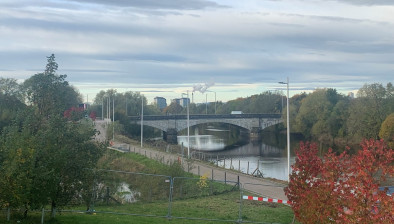Scottish Water creates £8.7m wetland to manage storm overflows
An innovative new environmental wetland project in Cowdenbeath by Scottish Water has been completed and promises to be an innovative storm water treatment method – as well as a boost for wildlife in the area.
The project was designed and delivered by reed bed specialists ARM Reed Beds (ARM) in partnership with Barhale Construction.
Located to the south of Cowdenbeath Golf Course and shielded by a row of trees, the new wetland, constructed at a cost of £8.7 million, will naturally treat storm waters from two separate overflow streams and then pass the treated water into the Lochgelly Burn.
The wetland will also provide an ideal habitat for birds, insects and amphibians. In time the wetland will become a mini eco system and add to the diversity of wildlife in the area.
The Cowdenbeath area is serviced by a combined sewer network which connects to the Cowdenbeath Waste Water Pumping Station (WWPS) and storm tanks before being transported for treatment at the Levenmouth Waste Water Treatment Works (WWTW) further downstream.
Several Combined Sewer Overflows (CSO) exist within the network and two of these CSOs were the focus of this overflow treatment project, namely Selkirk Avenue CSO and Cowdenbeath WWPS CSO.
The improved discharge quality at these overflows is part of a larger programme that aims to improve the water quality in a number of watercourses in the Cowdenbeath area, in particular the Lochgelly burn.
The Lochgelly Burn is the main watercourse in Cowdenbeath and flows to Loch Gelly, which is considered to be a sensitive waterbody.
Previously, in times of heavy rainfall, the excess waste water was passed through a screened outlet directly into the burn which the Scottish Environment Protection Agency (SEPA) classified as Class D - seriously polluted under their River Classifications Scheme.
The project will allow this excess waste water to be stored and treated to a significantly higher standard before allowing it to flow back into the natural environment. SEPA’s aspirations are that the standard is raised to classification A2 over time - this project will play a key part in that process.
Eddie Burns, project manager at Scottish Water, said: “The sewer overflows at two locations – the Cowdenbeath storm water works near Cowdenbeath Golf Course, and Selkirk Avenue – needed to be upgraded so they could continue to comply with modern environmental specifications. We are committed to finding the best solution for the local environment, and diverting the sewer overflows to a natural waste water treatment system proved to be the preferred option.
“Our solution is actually three separate projects. The first is to construct the wetland, another project to install a screen and a 1.2km transfer sewer from Selkirk Avenue. And finally we have upgraded the pumping stations and storm tanks near the wetland which previously transferred the storm waters.
“The new system will provide sufficient treatment to allow storm waters to flow back into the Lochgelly Burn without compromising water quality. Another upside is that it also creates a wildlife habitat for birds as well as insects, newts and other amphibious organisms.
“The project involved the construction of a specialised wetland and reed bed system that removes solids and forces oxygen into the waters, thus enabling it to reach a standard where it meets SEPA requirements for us to pass the flows into the Lochgelly burn.
“The result is a sustainable, low-carbon answer to a complex waste water management issue. The wetland is flexible in that we can alter how it treats the water depending on the flow, so in times of high flow the complex aeration system kicks in but otherwise it remains off and saves energy.
“The system ARM has designed is both cost-effective and in-line with how we want to treat waste water in the future. Once complete, the wetland system will require little maintenance, saving costs year-on-year which will benefit everyone.”
The wetland system can treat 230,000m3 a year, the equivalent of around 100 Olympic swimming pools. The waste water comes from around 11,000 customers in the Cowdenbeath area.
Scottish Water has invested heavily in Fife since 2002. £224.5m has been spent to improve water and waste water services across the region. In the 2010-2015 investment period, there is still a further £13.7m being invested, including a £2m refurbishment of Kirkcaldy waste water treatment works and a large number of smaller projects to upgrade the waste water network.





















